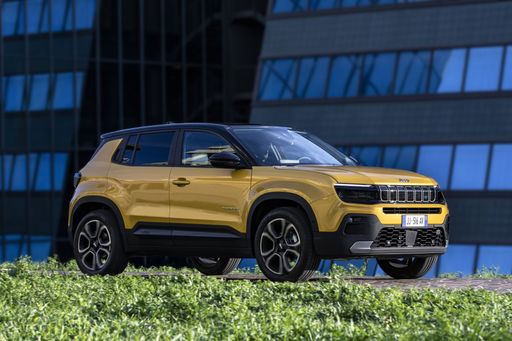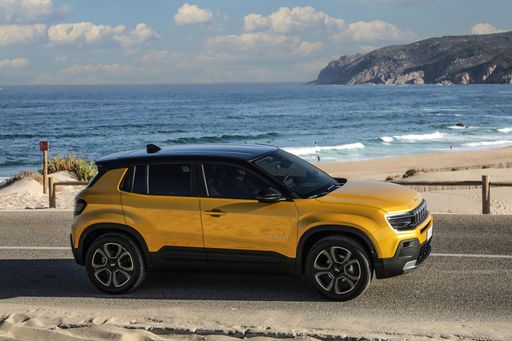Jeep Avenger vs Toyota Yaris - Differences and prices compared
Compare performance (156 HP vs 280 HP), boot space and price (21900 £ vs 21900 £ ) at a glance. Find out which car is the better choice for you – Jeep Avenger or Toyota Yaris?
Costs and Efficiency:
Price and efficiency are often the first things buyers look at. Here it becomes clear which model has the long-term edge – whether at the pump, the plug, or in purchase price.
Toyota Yaris has a hardly perceptible advantage in terms of price – it starts at 21900 £ , while the Jeep Avenger costs 21900 £ . That’s a price difference of around 85 £.
Fuel consumption also shows a difference: Toyota Yaris manages with 3.80 L and is therefore noticeable more efficient than the Jeep Avenger with 4.90 L. The difference is about 1.10 L per 100 km.
Engine and Performance:
Power, torque and acceleration are the classic benchmarks for car enthusiasts – and here, some clear differences start to show.
When it comes to engine power, the Toyota Yaris has a significantly edge – offering 280 HP compared to 156 HP. That’s roughly 124 HP more horsepower.
In acceleration from 0 to 100 km/h, the Toyota Yaris is decisively quicker – completing the sprint in 5.50 s, while the Jeep Avenger takes 9 s. That’s about 3.50 s faster.
In terms of top speed, the Toyota Yaris performs somewhat better – reaching 230 km/h, while the Jeep Avenger tops out at 194 km/h. The difference is around 36 km/h.
There’s also a difference in torque: Toyota Yaris pulls noticeable stronger with 390 Nm compared to 260 Nm. That’s about 130 Nm difference.
Space and Everyday Use:
Whether family car or daily driver – which one offers more room, flexibility and comfort?
Both vehicles offer seating for 5 people.
In curb weight, Toyota Yaris is hardly perceptible lighter – 1090 kg compared to 1180 kg. The difference is around 90 kg.
In terms of boot space, the Jeep Avenger offers distinct more room – 380 L compared to 286 L. That’s a difference of about 94 L.
In maximum load capacity, the Jeep Avenger performs noticeable better – up to 1277 L, which is about 342 L more than the Toyota Yaris.
When it comes to payload, Toyota Yaris barely noticeable takes the win – 525 kg compared to 502 kg. That’s a difference of about 23 kg.
Who wins the race in the data check?
The Toyota Yaris sits well ahead of its rival in the objective data comparison.
This result only shows which model scores more points on paper – not which of the two cars feels right for you.
Costs and Consumption
View detailed analysis
Engine and Performance
View detailed analysis
Dimensions and Body
View detailed analysis

Toyota Yaris
Jeep Avenger
The Jeep Avenger shrinks Jeep's boxy, adventurous styling into a city-friendly electric crossover that looks just as at home on tight streets as it does on muddy weekend lanes. It's a savvy pick for drivers who want go-anywhere attitude without the truck-size ego — practical inside, lively around town and ready to tackle a bit of rough stuff when the mood strikes.
details




Toyota Yaris
The Toyota Yaris is a sprightly city hatch that packs clever packaging, surprising comfort and fuel-sipping manners into a neat, easy-to-park package. It rewards sensible buyers with low running costs, friendly ergonomics and a forgiving drive, delivered with Japanese reliability and just enough personality to make errands feel a little less ordinary.
details

Costs and Consumption |
|
|---|---|
|
Price
21900 - 36900 £
|
Price
21900 - 46700 £
|
|
Consumption L/100km
4.9 - 5.7 L
|
Consumption L/100km
3.8 - 9.5 L
|
|
Consumption kWh/100km
15.50 kWh
|
Consumption kWh/100km
-
|
|
Electric Range
400 km
|
Electric Range
-
|
|
Battery Capacity
51 kWh
|
Battery Capacity
-
|
|
co2
0 - 129 g/km
|
co2
87 - 215 g/km
|
|
Fuel tank capacity
44 L
|
Fuel tank capacity
36 - 50 L
|
Dimensions and Body |
|
|---|---|
|
Body Type
SUV
|
Body Type
Hatchback
|
|
Seats
5
|
Seats
4 - 5
|
|
Doors
5
|
Doors
3 - 5
|
|
Curb weight
1180 - 1520 kg
|
Curb weight
1090 - 1356 kg
|
|
Trunk capacity
325 - 380 L
|
Trunk capacity
141 - 286 L
|
|
Length
4084 - 4088 mm
|
Length
3940 - 3995 mm
|
|
Width
1776 mm
|
Width
1745 - 1805 mm
|
|
Height
1527 - 1541 mm
|
Height
1455 - 1500 mm
|
|
Max trunk capacity
1218 - 1277 L
|
Max trunk capacity
935 L
|
|
Payload
494 - 502 kg
|
Payload
289 - 525 kg
|
Engine and Performance |
|
|---|---|
|
Engine Type
Electric, Petrol, Petrol MHEV
|
Engine Type
Full Hybrid, Petrol
|
|
Transmission
Automatic, Manuel
|
Transmission
Automatic, Manuel
|
|
Transmission Detail
Reduction Gearbox, Manual Gearbox, Dual-Clutch Automatic
|
Transmission Detail
CVT, Manual Gearbox, Automatic Gearbox
|
|
Drive Type
Front-Wheel Drive, All-Wheel Drive
|
Drive Type
Front-Wheel Drive, All-Wheel Drive
|
|
Power HP
100 - 156 HP
|
Power HP
116 - 280 HP
|
|
Acceleration 0-100km/h
9 - 10.6 s
|
Acceleration 0-100km/h
5.5 - 9.7 s
|
|
Max Speed
150 - 194 km/h
|
Max Speed
175 - 230 km/h
|
|
Torque
205 - 260 Nm
|
Torque
390 Nm
|
|
Number of Cylinders
3
|
Number of Cylinders
3
|
|
Power kW
74 - 115 kW
|
Power kW
85 - 206 kW
|
|
Engine capacity
1199 cm3
|
Engine capacity
1490 - 1618 cm3
|
General |
|
|---|---|
|
Model Year
2023 - 2025
|
Model Year
2024 - 2025
|
|
CO2 Efficiency Class
A, D, C
|
CO2 Efficiency Class
B, G
|
|
Brand
Jeep
|
Brand
Toyota
|
What drivetrain options does the Jeep Avenger have?
Available configurations include Front-Wheel Drive or All-Wheel Drive.




